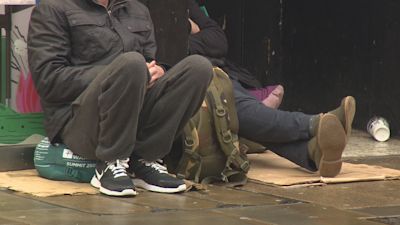Emergency accommodation for rough sleepers in Oxford open for 19th night

Oxford City Council has extended its severe weather emergency protocol (SWEP) again for people experiencing rough sleeping.
This means that emergency accommodation will continue to stay open until Monday morning (11 January), when the council will review the situation again.
As SWEP was first activated on 23 December it will have been open for 19 nights by Monday morning - the longest continuous period ever.
SWEP was open for 12 consecutive nights in March and April 2013 and again in 2018, when the Beast from the East gripped the country in February and March. An average of 10 people a night have accessed SWEP accommodation so far this winter, with a peak of 17 people on both New Year's Eve and New Year's Day.
What is SWEP?
SWEP is additional emergency accommodation for anyone experiencing rough sleeping - including people who have no right to claim benefits or housing in the UK or who have refused offers of accommodation and support.
In previous years this was provided in shared spaces but the need to keep people safe during the pandemic means they are now offered their own room for the night.
The council activates SWEP on every night the Met Office forecasts freezing overnight temperatures. It also uses its discretion to do so in other severe weather conditions. These can include snow on the ground, sub-zero 'feels like' temperatures or a warmer night in the middle of a freezing spell.
The current Met Office forecast is for freezing overnight temperatures until Sunday morning, with a sub-zero 'feels like' temperature on Sunday night. The council is therefore exercising its discretion to keep SWEP open on Sunday.
The council will decide whether or not to extend SWEP further on Monday morning (11 January). The current Met Office forecast suggests that SWEP may not remain open beyond Monday.
Allocating SWEP rooms
The St Mungo's outreach and assessment team (OxSPOT) is already working intensively with people experiencing rough sleeping in Oxford. OxSPOT will allocate SWEP rooms to people during the day and notify them where and when they need to go.
People who have not been allocated a SWEP room in advance will be able to present at O'Hanlon House between 11pm and midnight.
One of the SWEP venues is suitable for people with dogs and OxSPOT can also arrange free kennels if necessary. Kennels must be arranged in advance and are not available on the night.
SWEP and the pandemic
Until this winter SWEP beds were provided in shared sleeping spaces and government guidance says that councils can continue to do this where they believe SWEP can be provided in a Covid-safe manner.
However, the council believes this is not a realistic option given that England is now in national lockdown and there is a high risk of transmission in shared spaces. During the first lockdown vulnerable homeless people in England were moved out of shared hostels and this resulted in an infection rate of around 6-8%, whereas in American homeless shelters - where communal spaces remained open - the infection rate was between 60 and 70%.
Working with St Mungo's, Aspire and Homeless Oxfordshire, the council has secured 25 rooms across three venues and contingency plans are in place to provide more if the need arises.
When the pandemic struck last March the council offered safe emergency accommodation to vulnerable homeless people. This included people living in shared hostel spaces in O'Hanlon House and Floyds Row as well as people experiencing rough sleeping. It now has 118 rooms of interim housing in the YHA and Canterbury House that offer a bridge from emergency arrangements to more permanent housing.
So far the council has housed 303 vulnerable homeless people during the pandemic. Of these, 134 have been supported into more permanent housing and this includes a number of people who had been sleeping rough on a long term basis.
SWEP is additional provision and people accessing emergency beds this winter are likely to have refused previous offers of help, returned to the streets during the pandemic or to be newly homeless.